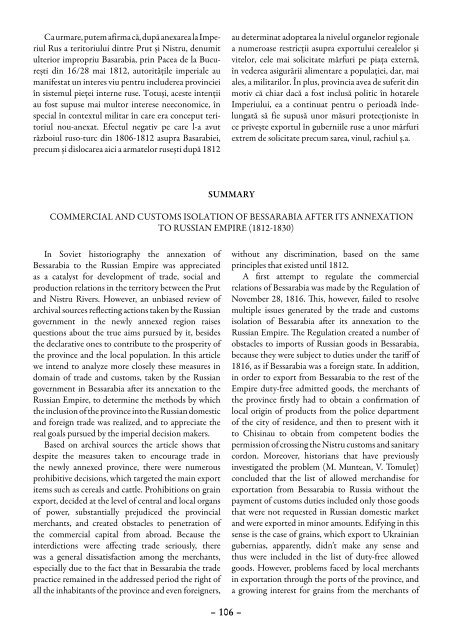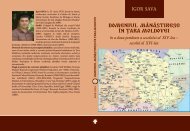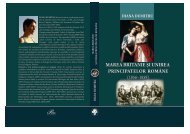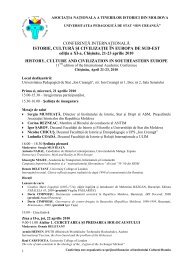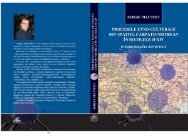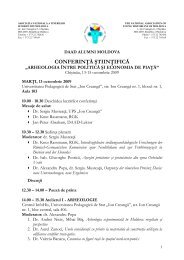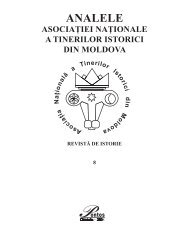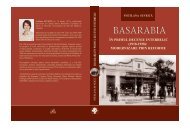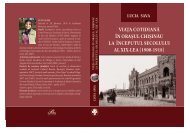aici - Asociatia Tinerilor Istorici din Moldova
aici - Asociatia Tinerilor Istorici din Moldova
aici - Asociatia Tinerilor Istorici din Moldova
You also want an ePaper? Increase the reach of your titles
YUMPU automatically turns print PDFs into web optimized ePapers that Google loves.
Ca urmare, putem afirma că, după anexarea la Imperiul<br />
Rus a teritoriului <strong>din</strong>tre Prut şi Nistru, denumit<br />
ulterior impropriu Basarabia, prin Pacea de la Bucureşti<br />
<strong>din</strong> 16/28 mai 1812, autorităţile imperiale au<br />
manifestat un interes viu pentru includerea provinciei<br />
în sistemul pieţei interne ruse. Totuşi, aceste intenţii<br />
au fost supuse mai multor interese neeconomice, în<br />
special în contextul militar în care era conceput teritoriul<br />
nou-anexat. Efectul negativ pe care l-a avut<br />
războiul ruso-turc <strong>din</strong> 1806-1812 asupra Basarabiei,<br />
precum şi dislocarea <strong>aici</strong> a armatelor ruseşti după 1812<br />
au determinat adoptarea la nivelul organelor regionale<br />
a numeroase restricţii asupra exportului cerealelor şi<br />
vitelor, cele mai solicitate mărfuri pe piaţa externă,<br />
în vederea asigurării alimentare a populaţiei, dar, mai<br />
ales, a militarilor. În plus, provincia avea de suferit <strong>din</strong><br />
motiv că chiar dacă a fost inclusă politic în hotarele<br />
Imperiului, ea a continuat pentru o perioadă îndelungată<br />
să fie supusă unor măsuri protecţioniste în<br />
ce priveşte exportul în guberniile ruse a unor mărfuri<br />
extrem de solicitate precum sarea, vinul, rachiul ş.a.<br />
SUMMARY<br />
COMMERCIAL AND CUSTOMS ISOLATION OF BESSARABIA AFTER ITS ANNEXATION<br />
TO RUSSIAN EMPIRE (1812-1830)<br />
In Soviet historiography the annexation of<br />
Bessarabia to the Russian Empire was appreciated<br />
as a catalyst for development of trade, social and<br />
production relations in the territory between the Prut<br />
and Nistru Rivers. However, an unbiased review of<br />
archival sources reflecting actions taken by the Russian<br />
government in the newly annexed region raises<br />
questions about the true aims pursued by it, besides<br />
the declarative ones to contribute to the prosperity of<br />
the province and the local population. In this article<br />
we intend to analyze more closely these measures in<br />
domain of trade and customs, taken by the Russian<br />
government in Bessarabia after its annexation to the<br />
Russian Empire, to determine the methods by which<br />
the inclusion of the province into the Russian domestic<br />
and foreign trade was realized, and to appreciate the<br />
real goals pursued by the imperial decision makers.<br />
Based on archival sources the article shows that<br />
despite the measures taken to encourage trade in<br />
the newly annexed province, there were numerous<br />
prohibitive decisions, which targeted the main export<br />
items such as cereals and cattle. Prohibitions on grain<br />
export, decided at the level of central and local organs<br />
of power, substantially prejudiced the provincial<br />
merchants, and created obstacles to penetration of<br />
the commercial capital from abroad. Because the<br />
interdictions were affecting trade seriously, there<br />
was a general dissatisfaction among the merchants,<br />
especially due to the fact that in Bessarabia the trade<br />
practice remained in the addressed period the right of<br />
all the inhabitants of the province and even foreigners,<br />
without any discrimination, based on the same<br />
principles that existed until 1812.<br />
A first attempt to regulate the commercial<br />
relations of Bessarabia was made by the Regulation of<br />
November 28, 1816. This, however, failed to resolve<br />
multiple issues generated by the trade and customs<br />
isolation of Bessarabia after its annexation to the<br />
Russian Empire. The Regulation created a number of<br />
obstacles to imports of Russian goods in Bessarabia,<br />
because they were subject to duties under the tariff of<br />
1816, as if Bessarabia was a foreign state. In addition,<br />
in order to export from Bessarabia to the rest of the<br />
Empire duty-free admitted goods, the merchants of<br />
the province firstly had to obtain a confirmation of<br />
local origin of products from the police department<br />
of the city of residence, and then to present with it<br />
to Chisinau to obtain from competent bodies the<br />
permission of crossing the Nistru customs and sanitary<br />
cordon. Moreover, historians that have previously<br />
investigated the problem (M. Muntean, V. Tomuleţ)<br />
concluded that the list of allowed merchandise for<br />
exportation from Bessarabia to Russia without the<br />
payment of customs duties included only those goods<br />
that were not requested in Russian domestic market<br />
and were exported in minor amounts. Edifying in this<br />
sense is the case of grains, which export to Ukrainian<br />
gubernias, apparently, didn’t make any sense and<br />
thus were included in the list of duty-free allowed<br />
goods. However, problems faced by local merchants<br />
in exportation through the ports of the province, and<br />
a growing interest for grains from the merchants of<br />
– 106 –


